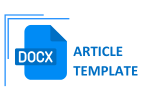Duties and Responsibilities of Editors
Publication Decisions
The editor is responsible for deciding which submitted articles should be published. This decision must be guided by the policies of the journal’s editorial board and comply with current legal requirements regarding libel, copyright infringement, and plagiarism. Editors may consult with other editors or reviewers in making this decision.
Fair Play
Editors should evaluate manuscripts for their intellectual content without regard to the authors’ race, gender, sexual orientation, religious belief, ethnic origin, citizenship, or political philosophy.
Confidentiality
Editors and editorial staff must not disclose any information about a submitted manuscript to anyone other than the corresponding author, reviewers, potential reviewers, other editorial advisors, and the publisher, as appropriate.
Disclosure and Conflicts of Interest
Unpublished materials disclosed in a submitted manuscript must not be used in an editor’s own research without the express written consent of the author.
Duties and Responsibilities of Reviewers
Contribution to Editorial Decisions
Peer review assists the editor in making editorial decisions and, through communication with the author, may also help the author improve the manuscript.
Promptness
Any selected reviewer who feels unqualified to review the research or knows that timely review will be impossible should notify the editor and withdraw from the review process.
Confidentiality
Manuscripts received for review must be treated as confidential documents. They must not be shared or discussed with others except with permission from the editor.
Standards of Objectivity
Reviews should be conducted objectively. Personal criticism of the author is inappropriate. Reviewers should express their views clearly with supporting arguments.
Acknowledgment of Sources
Reviewers should identify relevant published work that has not been cited by the authors. Any substantial similarity or overlap between the manuscript and any other published work of which the reviewer has personal knowledge should be reported to the editor.
Disclosure and Conflict of Interest
Privileged information or ideas obtained through peer review must be kept confidential and not used for personal advantage. Reviewers should not consider manuscripts in which they have conflicts of interest arising from competitive, collaborative, or other relationships or connections with the authors or institutions related to the papers.
Duties and Responsibilities of Authors
Reporting Standards
Authors of original research reports must present an accurate account of the work performed and provide an objective discussion of its significance. The data should be accurately represented in the manuscript, with sufficient detail and references to allow others to replicate the work.
Originality and Plagiarism
Authors must ensure that their work is entirely original. If they have used the work or words of others, proper citation or acknowledgment must be given.
Multiple, Redundant, or Concurrent Publication
Authors should not submit the same manuscript to more than one journal at the same time. Submitting the same manuscript to multiple journals is unethical and unacceptable.
Acknowledgment of Sources
Proper acknowledgment of the work of others must always be given. Authors should cite publications that have influenced the nature of the reported work.
Authorship of the Manuscript
Authorship should be limited to those who have made a significant contribution to the conception, design, execution, or interpretation of the research. All significant contributors should be listed as co-authors. The corresponding author must ensure that all co-authors have seen and approved the final version of the manuscript and have agreed to its submission.
Disclosure and Conflicts of Interest
All authors must disclose any financial or other substantive conflicts of interest that could influence the results or interpretation of the manuscript. All sources of financial support should be acknowledged.
Fundamental Errors in Published Works
If an author discovers a significant error or inaccuracy in their published work, they must promptly notify the journal editor or publisher and cooperate to retract or correct the manuscript.



_(2_x_5_cm)_(130_x_140_piksel)2.png)